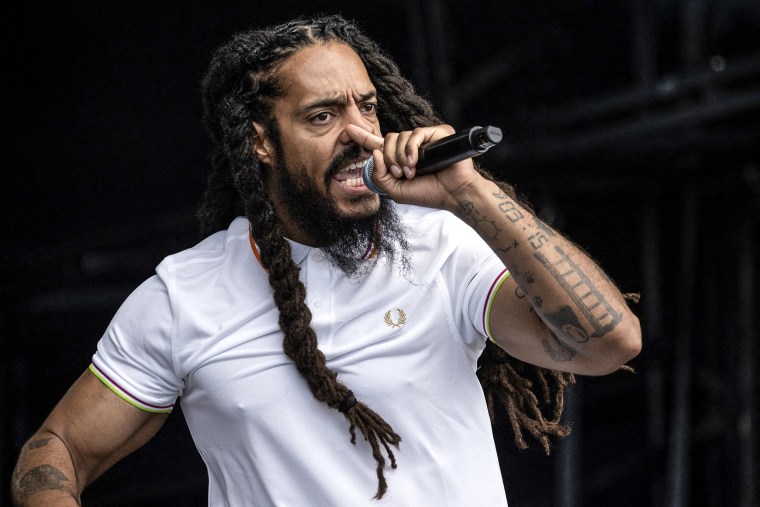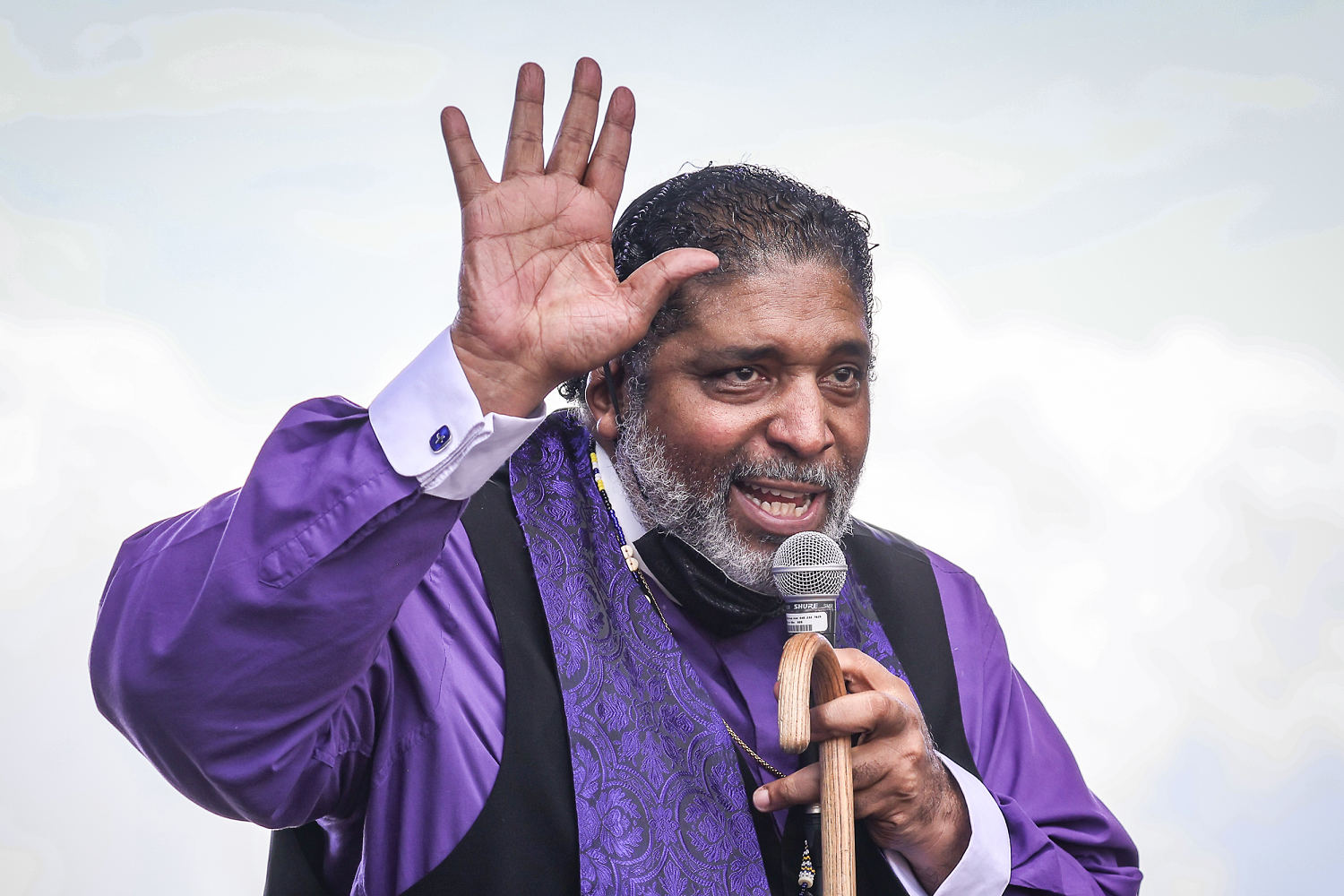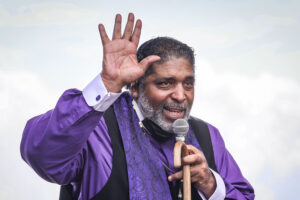The Dictatorship
Trump admin revokes visas for punk duo that chanted ‘death to IDF’ at Glastonbury Festival

English rap-punk duo Bob Vylan’s U.S. tour appears to be over before it even started. On Monday, the Trump administration announced it had revoked visas for the group’s members, following a controversial performance at the Glastonbury Festival in England over the weekend.
In a statement posted to X, State Department Deputy Secretary Christopher Landau said lead singer Bobby Vylan and drummer Bobbie Vylan, both of whom perform under pseudonyms, had been banned from entering the U.S. due to “their hateful tirade at Glastonbury.”
“Foreigners who glorify violence and hatred are not welcome visitors to our country,” Landau added.
The State Department’s decision came after the group’s appearance at the popular music festival on Saturday sparked intense backlash. During their performance, which was livestreamed on the BBC, Bobby Vylan led the crowds in chants of “free, free Palestine” and “death, death to the IDF,” referring to the Israel Defense Forces.
Behind the duo, a screen displayed the messages “Free Palestine“ and “United Nations have called it a genocide. The BBC calls it a ‘conflict,’” referring to Israel’s ongoing war in Gaza.
The BBC has since said it should have cut away from the broadcast, writing in a statement issued on Monday: “The team were dealing with a live situation but with hindsight we should have pulled the stream during the performance. We regret this did not happen.”

In statement on Instagram, organizers of Glastonbury — England’s largest festival —said they were “appalled” by the duo’s performance: “Their chants very much crossed a line and we are urgently reminding everyone involved in the production of the Festival that there is no place at Glastonbury for antisemitism, hate speech or incitement to violence.”
According to the group’s website, Bob Vylan was scheduled to kick off the “grandson North America Tour” in October, with almost 20 shows already planned in cities across the U.S. But without visas, that tour will likely be canceled.
On Sunday, Bobby Vylan addressed the controversy in a lengthy post on Instagram saying, “I said what I said.” The artist wrote that he had been “inundated with messages of both support and hatred.”
“Teaching our children to speak up for the change they want and need is the only way that we make this world a better place,” he wrote. “As we grow older and our fire possibly starts to dim under the suffocation of adult life and all its responsibilities, it is incredibly important that we inspire future generations to pick up the torch that was passed to us.”
The Dictatorship
Trump’s DOJ issues memo on plan to strip citizenship from some naturalized Americans

As the White House press secretary openly floats the idea of investigating New York City mayoral candidate Zohran Mamdani to possibly strip him of his citizenshipafter a bigoted proposal from Rep. Andy Ogles, R-Tenn., the administration appears to be revving up its denaturalization plans.
NPR reported Monday on a Justice Department memo from June 11which advises prosecutors in the DOJ’s Civil Division to prioritize the denaturalization of various naturalized citizens over alleged infractions ranging from war crimes to “material misrepresentations” in their citizenship applications.
In his first term, Trump expanded former President Barack Obama’s denaturalization policies. An expert told NPR why the new memo’s call to use civil litigation for this effort is particularly disturbing:
The DOJ memo says that the federal government will pursue denaturalization cases via civil litigation — an especially concerning move, said Cassandra Robertson, a law professor at Case Western Reserve University. In civil proceedings, any individual subject to denaturalization is not entitled to an attorney, Robertson said; there is also a lower burden of proof for the government to reach, and it is far easier and faster to reach a conclusion in these cases. Robertson says that stripping Americans of citizenship through civil litigation violates due process and infringes on the rights guaranteed by the 14th Amendment.
On the heels of Friday’s Supreme Court ruling in the birthright citizenship case — which undercut lower courts’ ability to stop the executive branch from pursuing policies of disputed legality — it’s safe to wonder whether and how the administration might wield its powers to target more Americans.
The DOJ memo asserts a broad latitude for interpretation as to what conduct might warrant denaturalization proceedings against a citizen. It lays out a list of transgressions, including torture and human trafficking, but also calls on the DOJ’s Civil Division to target “an individual that either ‘illegally procured’ naturalization or procured naturalization by ‘concealment of a material fact or by willful misrepresentation’” and, rather vaguely, “individuals who pose a potential danger to national security.” The memo also prioritizes the ominously open-ended “any other cases … that the Division determines to be sufficiently important to pursue.”
Given that Trump has labeled critics as the “enemy within,” has falsely framed peaceful demonstrators as accomplices to terrorism and has declared his ambition to deport American citizens to foreign prisonsthe potential for abuse here seems incredibly high.
The Dictatorship
Trump’s ‘big, beautiful bill’ faces fierce religious backlash

Donald Trump and the Republican Party are facing furious backlash from faith leaders and parishioners concerned about the devastating impact that their sought-after budget cuts are projected to have on many Americans.
Trump, who has attempted to portray himself as anointed by God, is pushing for a highly unpopular bill that includes steep cuts to nutrition assistance and health care programsalong with tax cuts that would largely benefit the rich. And many literally ordained faith leaders are denouncing his goals.
In a letter to U.S. senators last week, an interfaith coalition of religious leaders from across the country slammed how the bill could potentially strip health care and food benefits from millions of Americans, and for pursuing a mass deportation campaign that could ensnare some of their parishioners — a concern shared by MAGA-friendly leaders of the Southern Baptist Convention, as well.
“In our view, this legislation will harm the poor and vulnerable in our nation, to the detriment of the common good,” the coalition wrote. “Its passage would be a moral failure for American society as a whole.”
The U.S. Conference of Catholic Bishops sent a letter to senators on the same day, praising the bill for seeking to crack down on abortion but denouncing other parts of the legislation:
We are grateful for provisions that promote the dignity of human life and support parental choice in education. These are commendable provisions that have long been sought by the Church. However, we must also urge you to make drastic changes to the provisions that will harm the poor and vulnerable. This bill raises taxes on the working poor while simultaneously giving large tax cuts to the wealthiest. Because of this, millions of poor families will not be able to afford life-saving healthcare and will struggle to buy food for their children. Some rural hospitals will likely close. Cuts will also result in harming our environment.
The bishops also denounced the “enforcement-only approach” to immigration in the Senate version of the bill, calling it “unjust and fiscally unsustainable.”
Meanwhile, Sen. Raphael Warnock, D-Ga., who is a Baptist pastor, helped illustrate the growing religious backlash against the legislation when he brought a contingent of faith leaders with him to pray in the Capitol rotunda on Sunday.
The rotunda has been a site for faith-based resistance to the GOP’s budget for weeks now. In April, the Rev. William Barber II was arrested there alongside fellow faith leaders Jonathan Wilson-Hartgrove and Steven Swayne as they held a prayer in opposition to the legislation. (The arrests resulted in tickets.) Five other faith leaders were arrested there the following week for doing the same thing.
At times, I think it may be easy for some to give in to MAGA’s messianic propaganda that frames Trump — flawed as he is personally — as some sort of spokesperson for religious Americans. But there’s a deep and enduring tradition of faith leaders standing up for liberalism and basic dignity in this country. And Trump’s policies — perhaps, none more than his self-described “big, beautiful bill” — are bringing that tradition to the fore.
The Dictatorship
Ask Jordan: Could class-action lawsuits save birthright citizenship?

“Please explain why it appears that Justice Barrett’s opinion permits plaintiffs to resubmit their cases as a class action that would protect birthright citizenship nationwide.” — Emily
Hi Emily,
Yes — the court’s opinion in the birthright citizenship casewhich curbed the use of nationwide injunctions, left open the possibility of using class actions. In fact, plaintiff lawyers have already filed for such actions on Friday, the same day that the Supreme Court’s ruling came out.
“The Supreme Court has now instructed that, in such circumstances, class-wide relief may be appropriate,” plaintiff lawyers wrote to one of the trial judges who had previously issued a nationwide injunction.
They cited Justice Brett Kavanaugh’s concurring opinion that said trial courts can “grant or deny the functional equivalent of a universal injunction — for example, by granting or denying a preliminary injunction to a putative nationwide class.” They also cited Justice Sonia Sotomayor’s dissent, where she wrote that parents of children targeted by President Donald Trump’s order “would be well advised to file promptly class-action suits and to request temporary injunctive relief for the putative class pending class certification.”
So, just change the name of the lawsuit and it’s all good, right?
Not so fast. At least, not necessarily.
Indeed, Justice Samuel Alito wrote a concurrence to Justice Amy Coney Barrett’s majority opinion that pre-emptively raised skepticism about the success of class actions here. Joined by Justice Clarence Thomas, Alito worried that “today’s decision will have very little value if district courts award relief to broadly defined classes without following ‘Rule 23’s procedural protections’ for class certification.” (There are federal procedural rules for litigation and Rule 23 deals with class actions.)
Alito further warned that “lax enforcement” of the rules “would create a potentially significant loophole to today’s decision.” He urged federal courts to “be vigilant against such potential abuses of these tools.”
To be sure, that’s not a majority opinion from Alito, even if he tried to implicitly ascribe his views to the majority at the end there. But in practical terms, his concurrence reflects that there are at least two justices prepared to view class-action relief with skepticism. We may not learn what the full majority thinks unless and until the case goes back to them.
But hopefully the court will get to the heart of the matter sooner rather than later and declare what lower-court judges have had an easy time finding: Trump’s attempt to restrict birthright citizenship is unconstitutional.
Recall that the administration took pains to focus on the procedural aspect of the litigation, not seeking a ruling on the merits from a high court that’s been sympathetic to the administration in other cases. That strategic litigation choice appeared to be an admission that the administration thinks it would lose on the merits, if and when the justices reach them.
That made this case all the poorer a choice for the majority to have used to reach a formally unrelated decision about the validity of universal injunctions. The court could’ve taken on the injunction issue in any other number of cases.
Nonetheless, the next step in the birthright citizenship litigation may have to be another round of procedural games — this time on class actions — all while the underlying illegal order remains unremarked upon by the majority.
Jordan Rubin is the Deadline: Legal Blog writer. He was a prosecutor for the New York County District Attorney’s Office in Manhattan and is the author of “Bizarro,” a book about the secret war on synthetic drugs. Before he joined BLN, he was a legal reporter for Bloomberg Law.
-

 The Josh Fourrier Show8 months ago
The Josh Fourrier Show8 months agoDOOMSDAY: Trump won, now what?
-
Uncategorized8 months ago
Bob Good to step down as Freedom Caucus chair this week
-

 Politics8 months ago
Politics8 months agoWhat 7 political experts will be watching at Tuesday’s debate
-

 Politics8 months ago
Politics8 months agoHow Republicans could foil Harris’ Supreme Court plans if she’s elected
-
Economy8 months ago
Fed moves to protect weakening job market with bold rate cut
-
Economy8 months ago
It’s still the economy: What TV ads tell us about each campaign’s closing message
-

 Politics8 months ago
Politics8 months agoRFK Jr.’s bid to take himself off swing state ballots may scramble mail-in voting
-
Uncategorized8 months ago
Johnson plans to bring House GOP short-term spending measure to House floor Wednesday









